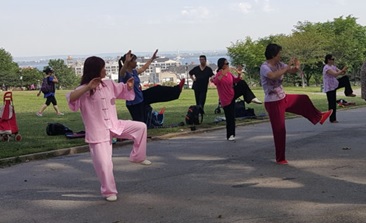At The Top Of The Hill

By Gene Aronowitz
When we lived in Brooklyn, my wife, Linda, and I liked to go to a local park to walk and do Tai Chi.
Every morning the health seekers assembled. They are almost all Chinese, true to their tradition of involvement in these healthful morning activities. They are obviously responsible for the transformation of the early morning park from a bedroom and bathroom for drug addicts and homeless people to a vibrant, exciting, life-affirming haven. Not long after we began coming to the park, we noticed that we were being enveloped endearingly by some of them.
Invariably, we saw “The Smiling Man,” as we called him, walking toward us as we entered the park each morning. He was usually deep in conversation but when we passed, he would stop talking in order to greet us with a smile and a “Good morning.” Soon, he began to cross his arms back and forth above his head as we approached. If I saw him first, I would sometimes raise my arms in a Rocky-style “V” and he would respond in kind.
“Woman Walking Backwards” and her friends beamed when they saw us, filling the air with broken English “Good Mornings.” Their waves were sideways, like windshield wipers.
There was a group we named “The Elders” who assembled on and around a bench waiting for their leader before moving to the area they used for organized exercise with Chinese music accompaniment. As we passed their bench, they would all raise their hands, as if being led by an unseen conductor, and wave to us.
A married couple we called “The Omers” would start their exercise routine with an energetic OM. Mrs. Omer would frequently walk over to where we were doing Tai Chi and say hello.
We observed two people from a distance. One was a stunning, energetic, agile, and graceful woman who did silk exercises at the park’s summit. We named this remarkable person “The Tigress.” She seemed unaware of us although once, when we were doing Tai Chi, Linda thought she saw her look back as she walked to her spot.
The other was a man who did Chi Gong with a form that I could tell was superb just by the confidence he exuded as he went through his routine. He was smooth, exceptionally well-balanced, very strong, focused, and disciplined. My first thought was to call him “Euphrates” to parallel “The Tigress” but we ended up calling him Yangtze.
One day, I brought my camera to the park and photographed The Smiling Man, the Omers, Woman Walking Backwards, and The Elders. We also approached The Tigress and Yangtze, telling each that we watched them every day and that they inspired us. Although they were initially a bit shy and hesitant, they agreed to have their pictures taken and did so with grace.
Both The Tigress and Yangtze began to wave at us, at first only if we waved while they were looking. But within a few days, The Tigress seemed to watch for us and would wave seamlessly as if it was part of her routine. When we walked close to Yangtze, he too would wave and smile.
When the summer came to a close and Linda had to go back to her school job early in the morning, we would do Tai Chi in our house, and, on weekdays, I would walk in the park by myself. One day, I chose a path that passed the place where the Omers exercised. Mrs. Omer approached me, took my hands in hers, and kissed me, once on each cheek. I was completely caught off guard, smiled at her but walked away quickly, a reaction that continues to embarrass me.
Our communication with all of these lovely people was wonderfully affirming. And this was New York City where people can live for a lifetime on the same street or even on the same floor of an apartment building and never acknowledge each other.
We wonder if their reaction may have something to do with their seeing us doing Tai Chi in a diligent and respectful way. Perhaps we honored them by doing that. Maybe we just encountered a group of unusually friendly people. Whatever it was, I loved it and wish that everything else in my life could be like it was at the top of the hill in Sunset Park.


